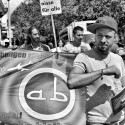Tag: Antiziganismus
-
Gemeinsam gegen Polizeigewalt!
#Act4RomaLives! Freitag, 25.06.2021, 16:00 Uhr Vor der Tschechischen Botschaft, Wilhelmstraße 44, 10117 Berlin Am Samstag, den 19. Juni 2021 starb der Rom Stanislav Tomáš, in Tschechien, nach einem brutalen Polizeieinsatz durch drei Polizisten auf offener Straße. Der 46 jährige Rom Stanislav Tomáš wurde in Teplice umgebracht. Sechs Minuten lang kniete ein Polizist auf seinem Hals,…
-
MESSERANGRIFF AUF ROMA: PROZESSBEGINN
vom Roma Antidiskrimination Network 24.09.2019 Mit der Verlesung der Anklage begann gestern der Prozess gegen Marias Angreiferin. Der Staatsanwalt äußerte, die Angreiferin habe mit ihrem Verhalten in Kauf genommen, dass Maria und ihre Verwandten sterben. Die Angeklagte wollte sich nicht äußern und ihr Anwalt hat in ihrem Namen eine Erklärung vorgelesen. In ihrer Aussage schilderte…
-

Right to stay for Hikmet! Bleiberecht für Hikmet!
Hikmet’s is getting the answer about “Bleiberecht” from the “Petition Office” Dec. 1. if he doesn’t get it he is threatened with deportation. And the oldest of his two brothers is also being threatened with deportation. Wir alle hoffen jetzt auf ein “Bleiberecht”, die Anhörung ist am 1. Dezember. Inzwischen droht ihrem älteren Bruder dasselbe…
-
Demonstration and Rally – All Sinti and Roma stay! – Demo und Dauerkundgebung – Alle Sinti und Roma bleiben. Freitag 03.06.2016 um 17 h Alexanderplatz
Demonstration and Rally for the Right to Stay for all Sinti and Roma – call in english see below Bleiberecht für alle Sinti und Roma. Solidarität mit den vom “Denkmal für die im Nationalsozialismus ermordeten Sinti und Roma” geräumten Roma. Achtung!!! Da noch weitere betroffene Menschen teilnehmen möchten und erst in den nächsten Tagen anreisen…
-
Stellungnahme IniRromnja zur Protestaktion von Romano Jekipe
Stellungnahme IniRromnja Das Berliner Denkmal/Mahnmal für die Ermordeten Sinti und Roma Europas wurde am 22.5.2016 zum Protestort einer Gruppe Romn*ja, Familien mit Kindern und Einzel-Aktivist*innen, die sich mit einer Verzweiflungstat gegen ihre drohende Abschiebung stellten. Ihre Planung bis zur Pressekonferenz am kommenden Tag, den 23.05. um 11 Uhr zu verweilen wurde durch eine gewaltvolle Räumung…
-
Offener Brief der Rroma Familien im Görlitzer Park, bezüglich der drohenden Wegnahme ihrer Kinder
an die Bezirksbürgermeisterin Monika Herrmann, den Bezirksstadtrat Peter Beckers, den Sozialstadtrat Knut Mildner – Spindler, die übrigen Mitglieder des Bezirksamtes und die Mitarbeiter*innen des Jugend- und Sozialamts Friedrichshain-Kreuzberg Berlin, 23.9.2014 Das Bezirksamt Friedrichshain-Kreuzberg droht obdachlosen Familien im Görlitzer Park und der Cuvry-Brache mit der Inobhutnahme ihrer Kinder (“offener Brief” als PDF) (wenn ihr diesen Brief…